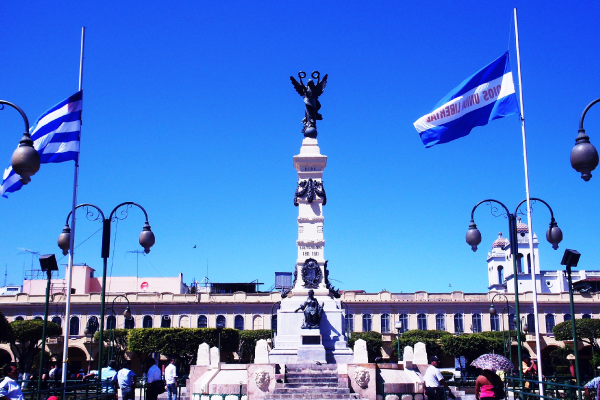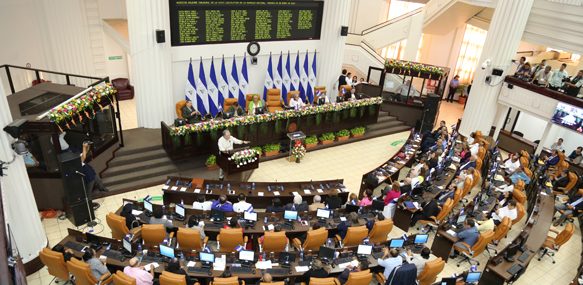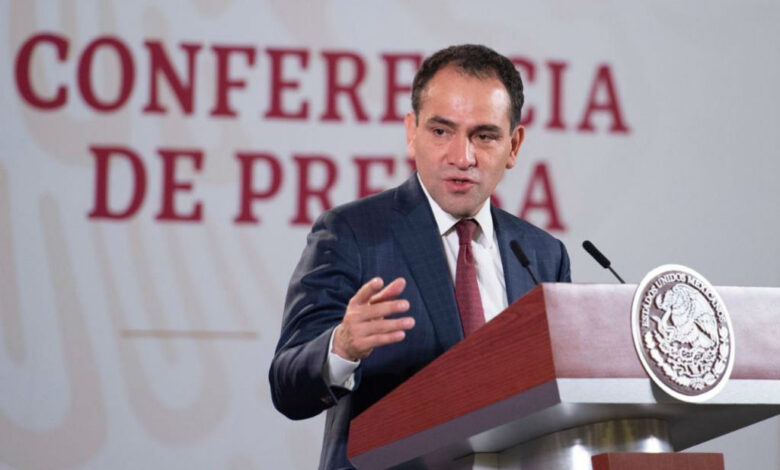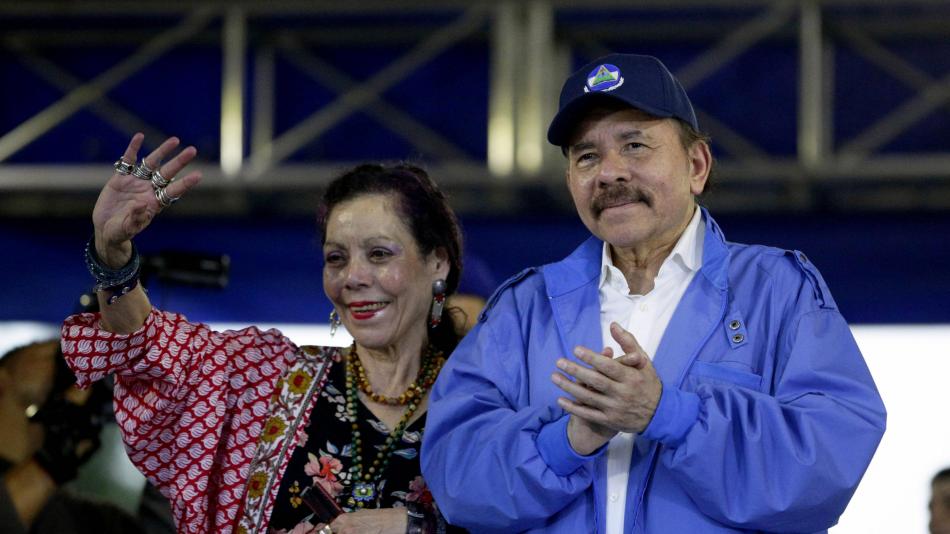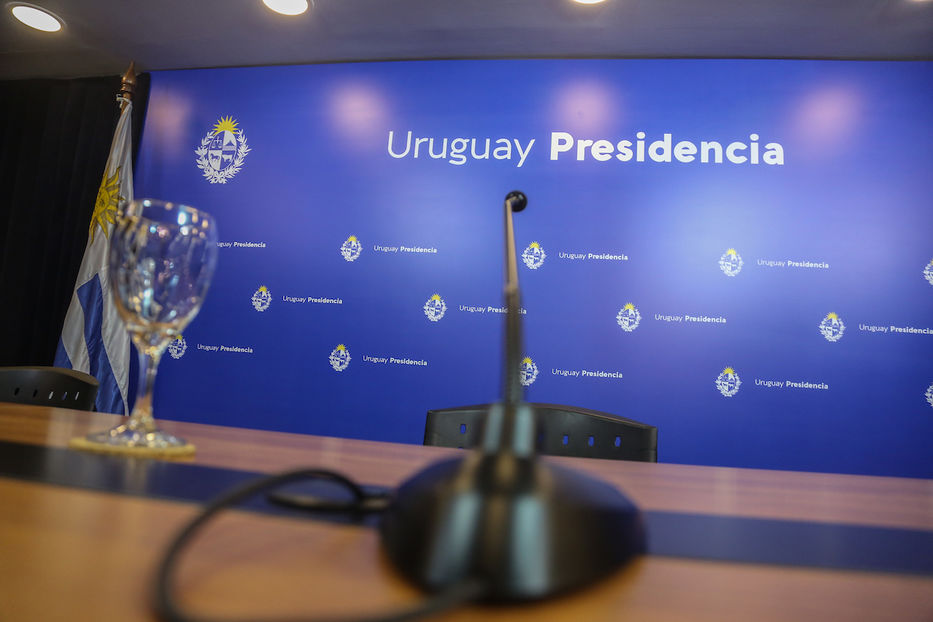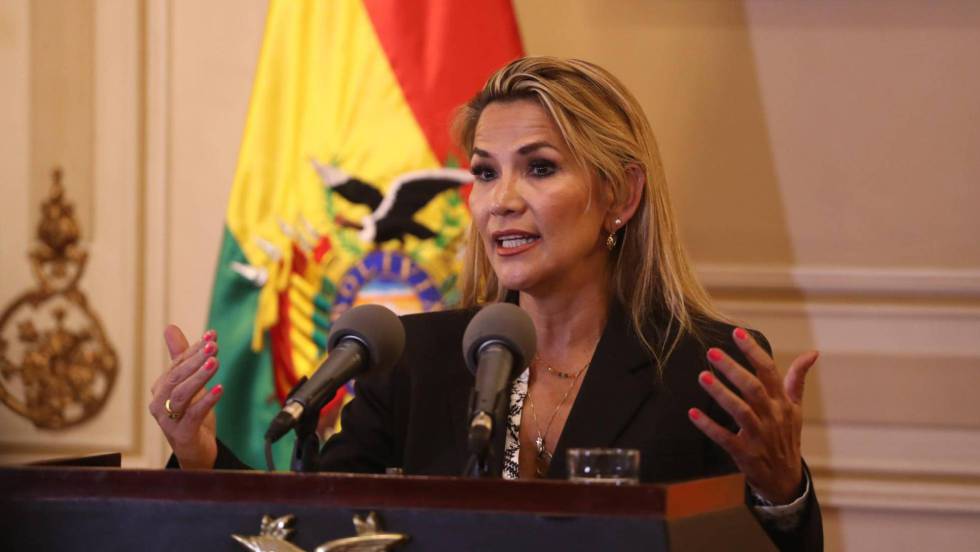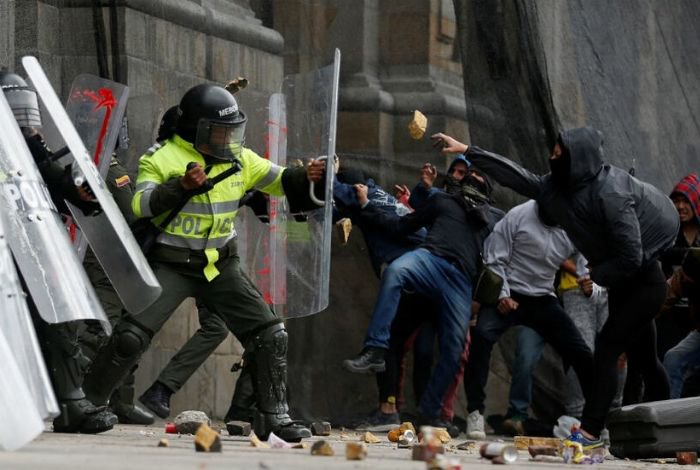
A tool designed by Directorio Legislativo to monitor
regulations with the potential to impact civic space
in Latin America and the Caribbean.
Fundación Directorio Legislativo | September 2020
About Civic Space Guardian (CSG)

Civic Space Guardian (CSG) is a tool designed by Directorio Legislativo to monitor regulations with the potential to impact civic space in Latin America and the Caribbean.
These are regulations affecting freedom of expression, freedom of association, freedom of peaceful assembly, citizen participation and access to public information. To provide a broader overview, we also include the rating assigned by Civicus according to the state of civic space in each country.
Ruling party Bill seeks prison sentences for those spreading ‘false news’

Nicaragua
Impact | Negative
Probability | High
Civicus Rating | Repressed
The ruling party Frente Sandinista de Liberación Nacional (FSLN) has presented a Special Cyber-crime Bill which seeks to punish with prison sentences of two to four years those who “publish or disseminate false, distorted information that causes alarm, anxiety and fear in the population”.
The punishment can rise to five years in cases deemed to “incite hatred and violence”. The bill also criminalizes a very diverse set of crimes from unauthorized access and the alteration or damage of computer systems, to identity replacement, use of personal data, fraud and sexual harassment in the digital environment.
The President of the Legislative Assembly, Gustavo Porras, declared the aim of the bill to prevent cybernetic tools from being used to harm anyone’s “image, honor, and family”. However, civil society has warned that the ambiguity in the definition of the punishable acts can lead in practice to criminalizing the daily use of information and communication technologies, and also to threatening the exercise of freedom of expression through criticism, parody, and satire. The bill has already been passed by the Justice, Education and Infrastructure Committees and could be sanctioned before the end of October.
The government promotes a bill to control organizations that receive foreign funding

Nicaragua
Impact | Negative
Probability | High
Civicus Rating| Repressed
On September 22, the 70 deputies who make up the ruling Sandinista National Liberation Front presented a bill that seeks to limit the action of organizations that have foreign funding. If enacted, all entities, foundations and associations that receive funds from abroad will be required to register as “foreign agents”. In addition, they will be obliged to inform the Ministry of the Interior when they receive an offer of funds, explain what activities the funds will be used for, and report on expenditures, payments and contracts. Donations from foreign sources may not be used in activities that have not been previously declared and registered in a dedicated web portal. In the event of non-compliance, the Ministry may impose fines or cancel its legal status. Since 2018, the Nicaraguan government has cancelled the legal status of 10 civil society organizations without due process. The legislative treatment of the bill could begin in the next few days.
The government seeks to prohibit organizations from receiving funding from sources outside their activity

México
Impact | Negative
Probability | High
Civicus Rating | Repressed
On September 9, the Secretary of Finance and Public Credit, Arturo Herrera, presented to the Chamber of Deputies a tax reform that proposes limiting the financing of organizations, foundations and trusts authorized to receive donations deductible from Income Tax (ISR). When more than 50% of its funds come from sources unrelated to its corporate purpose, they may lose their permission to operate. They must also allocate all their assets to other entities authorized to receive donations deductible from ISR. According to the current law, there are 12 activities that would be covered by this restriction, including welfare, educational, research, cultural, and ecological organizations. Currently, the Law of Civil Society Organizations prohibits donations from sources that do not match the corporate purpose registered by the institution. The objective declared by the Mexican authorities is “to prevent these entities from carrying out activities aimed at obtaining a profit.
By law, requests for access to public information can no longer be charged

Colombia
Impact | Positive
Civicus Rating | Repressed
President Iván Duque enacted the so-called “anti-paperwork law” on August 25, which establishes cross-cutting guidelines to streamline administrative processes in all dependencies of the National Executive Branch. From now on, the procedures prior to the enactment of the Transparency and Access to Information Law that have a cost and meet the characteristics of a request for access to public information must be provided by the State free of charge. This provision does not, however, reach the special rules related to the commercial, labor, professional and social security branches. The law also requires that the procedures that are created from its enactment can be carried out by citizens completely online. For the implementation of these policies in each public agency, citizen relations offices should be created in the departments, districts and municipalities that have a population of more than 100,000 inhabitants.
Ortega wants to recognize “hate crimes” in the Penal Code

Nicaragua
Impact | Negative
Civicus Rating | Repressed
On September 14, President Daniel Ortega urged the Supreme Court of Justice to work on a proposal to reform the Penal Code to recognize “hate crimes” and punish them with life imprisonment. The president’s statements came after a high-profile case of gender violence. However, both criminal law specialists and representatives of the opposition fear that, if successful, the government could use the figure of hate crime to limit freedom of expression and the right to protest. Some even compare the proposed reform with the Law against hatred in Venezuela, approved by the National Constituent Assembly in 2017 (see more). Ortega himself fueled these doubts by accusing the opposition of “continuing to commit murders, planting bombs and murdering families,” acts which he also described as “unforgivable.” Currently, the Penal Code does not classify hate crimes, but considers ideological or political discrimination as a circumstance that aggravates criminal responsibility.
Deputies reject bill that expands the role of the armed forces in internal security

Chile
Impact | Negative
Probability | Medium
Civicus rating | Narrowed
On September 9, due to a lack of quorum, the Chamber of Deputies rejected a draft constitutional reform that seeks to increase the President’s ability to post the Armed Forces in the streets when critical infrastructure is at risk, such as: services of water, gas and electricity, communications and transportation, among others. If the reform is approved, he will be able to do so without declaring a state of emergency and for a period of up to 30 days: 15 more than those currently provided by the Constitution. Initially, the bill also included the protection of public buildings such as La Moneda, the Public Ministry or the Judicial Courts, but these were eliminated by the Senate. Due to the setback in the Chamber of Deputies, the bill will be examined by a Joint Committee made up of representatives of both houses of Congress, who must agree on a new text or reject it.
Deputies receive delegations to analyze new media law promoted by the government

Uruguay
Impact | Negative
Probability | Medium
Civicus Rating | Open
The Industry Committee of the Chamber of Deputies began the study of a media bill promoted by the government to replace the current regulation, with a round of consultations that so far included ten delegations. The text has not lacked debate since the beginning of its legislative process. Among its most questioned points, three stand out. First, it will enable greater concentration in the telecommunications sector by expanding the amount of media under the control of the same person or company. Second, it eliminates journalists’ right to exercise conscientious objection, that is, the right to refuse accompanying with their image, voice or name contents of their authorship that were modified without consent. This point recognized in the current law represents a “setback in rights,” according to representatives of local civil society. Third, the bill eliminates advances made in terms of visual and hearing accessibility for people with disabilities, thus limiting freedom of expression and information with equal opportunities (for example, subtitled programming, sign language and audio-description). The Industry Committee plans to hold new rounds of hearings with interested stakeholders. However, the expectation is that the bill, which is still in an initial phase of discussion, will not be resumed until October, when the debate on the National Budget concludes.
For an assessment of the bill by the Civil Society Coalition for a Democratic Communication Policy, click here.
Bill regarding modernization of security forces one step away from approval

Chile
Impact | Positive
Probability | Medium
Civicus Rating | Narrowed
On September 7, the Citizen Security Committee of the Chamber of Deputies approved a bill that seeks to modernize institutional management and strengthen probity and transparency in the Public Security Forces. The bill provides for the creation of a system to evaluate the protocols and procedures of the outcome of police management. The goal is to control institutions in the face of possible abuses and to prevent breaches of probity, violations and noncompliance with rules of conduct. In addition, the Carabineros Corps and the Investigative Police of Chile must develop a system of preventive control of the declarations of assets and interests of the officers, which will aim to detect suspicious patrimonial variations. If approved, the Investigative Police must also produce and make available to civil society statistics and territorially disaggregated institutional information on a virtual platform. The bill was sent to the Finance Committee and is one step away from being approved by the plenary session of the
Special legislative committee to investigate government harassment of journalists and media

El Salvador
Impact | Negative
Civicus Rating | Obstructed
In mid-August, the Legislative Assembly formed by agreement a Special Committee to investigate the harassment of journalists by the government and its alleged financing with public funds. The 61 attacks reported by the Association of Journalists (APES) to social communicators critical of the government range from slander and expressions of discredit on social networks, to threats and surveillance. The complaints about government acts that violate freedom of expression began on the same day that Nayib Bukele was inaugurated, after the arrest of photojournalist Jorge Reyes. Since then, the president has launched various offensive attacks against media workers, using adjectives such as “pamphlets,” “paid pens,” and “sold media.” On Twitter, both officials and supporters and trolls have responded with criticism, misogynistic comments and even death threats to communicators who express opinions contrary to the official voice. These events have been denounced by important entities such as the Inter-American Press Association, the Commission on Freedom of the Press and Information, and the Office of the Special Rapporteur for Freedom of Expression of the Inter-American Commission on Human Rights. The Special Committee, made up of six legislators, is already gathering information to prepare a report on what is considered a “matter of national interest.”
The Constitutional Court gives green light to law regulating the “state of exception”

Bolivia
Impact | Positive
Civicus Rating | Obstructed

Voices of Civil Society
Colombia
Communiqué Alarming concentration of power in the Executive branch in Colombia: “During the pandemic, a trend towards increased discretionary powers of the Executive branch has been identified in many countries (…). The discretionary powers of the executive branches in the midst of the pandemic and for the purpose of economic reactivation, are not blank checks for the use of public resources or to make critical decisions concerning the way democracy works.”
Transparency International and Transparencia por Colombia
09/03/2020

Public declarations
Alejandro Giammattei
President of Guatemala (in the Congress session for the 199th anniversary of the country’s independence): “It would be useless to speak of freedom of thought if it is not possible to express ourselves, but expressing oneself means a very great responsibility that must be taken seriously. The formation of ideas, ideologies and different ways of understanding our reality represents a fundamental part of freedom of expression. Freedom of expression has a limit, the limit is the truth.”
September 15, 2020.
Jair Bolsonaro
(to a journalist)
“My wish is to fill your mouth with punches.”
August 23, 2020

Information of Interest
Nicaragua
On September 10, the Inter-American Commission on Human Rights (IACHR) reported that 45 protesters were arbitrarily detained in the past month. These events took place after sectors linked to the organization “Alianza Cívica” posted posters on public roads with slogans against the government of Daniel Ortega in 132 municipalities of the country. The IACHR called for reforms to guarantee an end to repression of opponents and democratic participation. Alianza Cívica issued a statement declaring a national political alert to the “repressive escalation of police violence” and called on the OAS, the European Union and the UN to promote actions to “protect the people of Nicaragua.” The United Nations High Commissioner for Human Rights, Michelle Bachelet, stated that no progress has been observed regarding the human rights situation in the country, nor has there been any evidence from the government to “constructively address the tensions and structural problems” that triggered the sociopolitical crisis of April 2018.
Venezuela
On September 16, the Independent Mission of Venezuela, an agency of the UN Human Rights Council, presented a report accusing the government of Nicolás Maduro of committing crimes against humanity. According to the entity, since 2014 the Executive branch “has planned serious human rights violations [extrajudicial executions, forced disappearances and arbitrary detentions], some of which constitute crimes against humanity.” Along the same lines, a report by the social organization Foro Penal published in mid-August shows that between January and July, 281 citizens were victims of arbitrary arrests for protesting the lack of provision of basic services and fuel, and posting messages that questions the national policy against the COVID-19 pandemic. To carry out the arrests, the authorities relied on the decree of declaration of national alarm and the controversial Law against Hate, for Peaceful Coexistence and Tolerance approved by the National Constituent Assembly in 2017.

More by Directorio Legislativo
Image of Power. Power of an Image
Legislative obstacles across Latin America- by María Baron.
We strengthen democracies in Latin America
We are a non-partisan and independent organization that for 10 years has been promoting the constitution of autonomous, flexible, democratic and independent spaces, through dialogue with various actors in the public, private, academic and civil society sectors. The starting point of our work arises from the recognition and appreciation of the political and social plurality of Latin America.

Fundación Directorio Legislativo
Avenida Entre Ríos, 258 – 3E
Ciudad Autónoma de Buenos Aires, Argentina (C1079ABP)
Phone (+5411) 5218-4647

